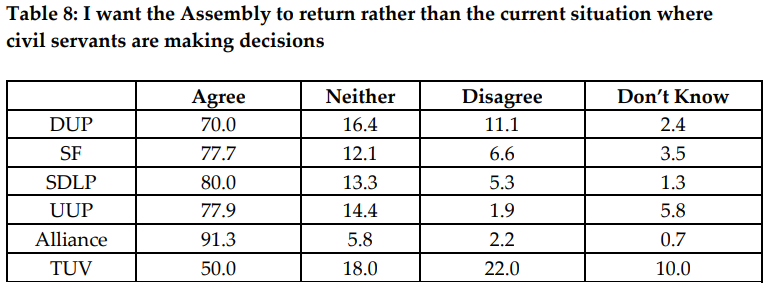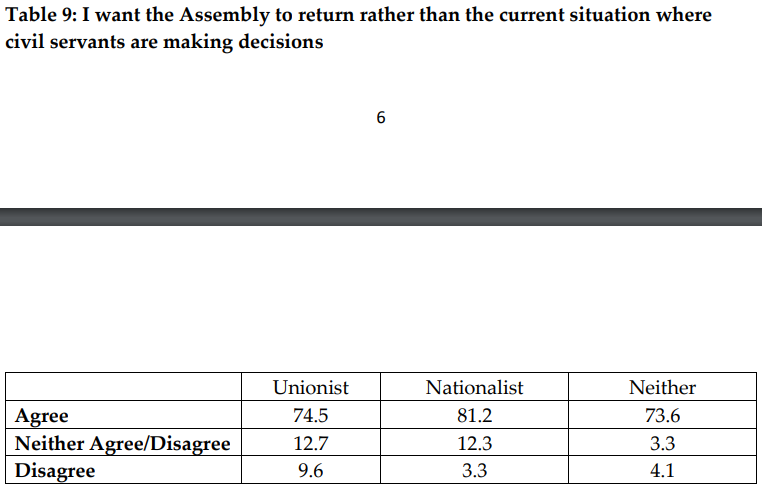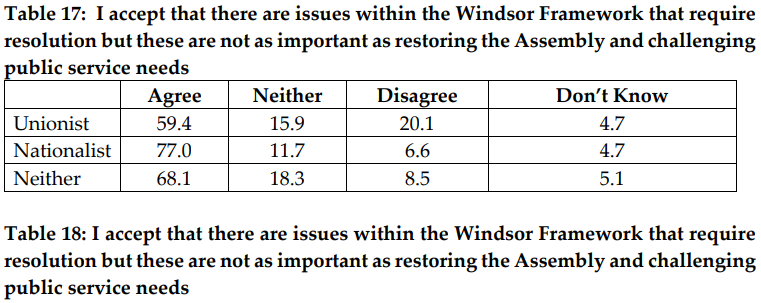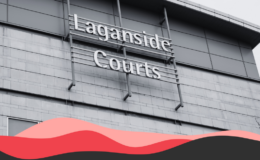- Recent polling indicates that a significant majority of people in Northern Ireland want Stormont up and running.
- The central basis for the institutions’ collapse over the past two years has been unionist opposition to the Windsor Framework. This new polling indicates that Unionists – as well as Nationalists and Others – consider the Assembly’s return to be more important than resolving issues with the Framework.
- In particular, within unionism, the data suggests that DUP and UUP voters want devolution back. Only TUV voters think opposing the Framework is more important than restoring devolution.
Professor Shirlow is the Director of the Institute of Irish Studies at the University of Liverpool. On 29 January, he claimed in a post on social media that: “People want the Assembly back”
The post also contained a link to recent polling results on this issue. Based on that polling data, this claim is backed by evidence.
Data, collected by the University of Liverpool in October and November last year, indicates that the NI public is largely in favour of Stormont’s return when compared with the current status quo where civil servants are held responsible for making decisions about public services.
It also suggests that Unionists – as well as Nationalists and Others – consider restoring Stormont to be more important than opposing the Windsor Framework..
This is also true for voters who indicated support for each of the five main parties (Sinn Féin, DUP, Alliance, UUP and SDLP). Per the polling, only TUV voters overall believe opposing the Framework is more important than devolution.
Given all this information, it is fair to say that the people want the institutions restored.
- Polling disclaimer
Polling is one of the central methods to measure the views of the public on any given issue at a certain point in time.
However, all polling comes with some caveats. Polls measure opinions at a snapshot in time and are, in some ways, out of date as soon as they are published.
Polls also come with a certain margin of error, depending on sample size and overall population size.
- Context
Survey data for this recent polling by the University of Liverpool was collected between 26 October and 3 November last year. It is based on a sample of 1,074 adults in NI, with the data weighted so it is demographically representative of the adult population and “has a margin of error of +/- 3.1% at the 95% Confidence Level”.
The Northern Ireland Executive collapsed almost two years ago because of Unionist opposition to post-Brexit arrangements between Northern Ireland and the rest of the UK.
These objections are ultimately the reason why devolution has not been operational since then.
The recent polling takes account of this. Many of the questions either hinge on the Windsor Framework or factor this issue into the framing of questions and wording of answers participants could choose from.
- Results
First of all, the polling gives a clear indication that the public is dissatisfied with the status quo of no Executive, no real Assembly, and senior civil servants being left to make some decisions – per their legal rights and obligations – while no ministers are in post.

Figure 1 – source: University of Liverpool’s Institute of Irish Studies polling


Figure 2 – source: University of Liverpool’s Institute of Irish Studies polling
Unionist voters in general, and the voters for each of the three largest unionist parties, want to see a return to Stormont.
However, how do they view restoration of the institutions when the Windsor Framework is factored in?

Figure 3 – source: University of Liverpool’s Institute of Irish Studies polling


Figure 4 – source: University of Liverpool’s Institute of Irish Studies polling
All three major voting blocs, including Unionists, say that restoring the Assembly and trying to address public service challenges is more important than opposing the Windsor Framework.
To a greater or lesser degree, this same view is held by voters for each of the largest five parties. Only survey participants identifying as TUV voters expressed the broad opinion that opposing the Framework is more important than bringing back Stormont and trying to fix public services.
The Institute of Irish Studies report states:
“Tables 17 and 18 [figures 3 and 4, above] consider, by identity and voting, if resolving the Windsor Framework is more important that [sic] restoring the Assembly. In terms of identity a majority of all identity groups agree with a c3 fold difference between unionists in agreement compared to those who disagree. There is a lower ratio among DUP voters but still a 2 to 1 ratio in favour of agreement versus disagreement.”
Significant opposition to the Windsor Framework remains – see Table 19 in the survey results – amongst DUP and, particularly, TUV voters. However, the same survey clearly shows that the majority of those surveyed identified as Unionists, Nationalists, or Neither (Other) see the restoration of the Assembly as a greater priority than resolving the Framework.




